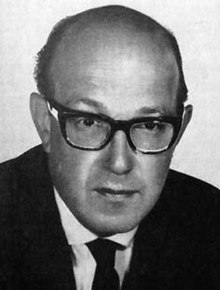Jay Livingston
Jay Livingston | |
|---|---|
 | |
| Born | Jacob Harold Levison March 28, 1915 McDonald, Pennsylvania, U.S. |
| Died | October 17, 2001 (aged 86) Los Angeles, California, U.S. |
| Alma mater | University of Pennsylvania |
| Occupation | Composer |
| Years active | 1937–2001 |
| Spouse(s) | Lynne Gordon (1947–1991; her death; 1 child)Travilyn Shirley Mitchell (1992–2001; his death) |
Jay Livingston (born Jacob Harold Levison, March 28, 1915 – October 17, 2001) was an American composer best known as half of a song-writing duo with Ray Evans that specialized in songs composed for films. Livingston wrote music and Evans the lyrics.
Early life and career[]
Livingston was born in McDonald, Pennsylvania; he was born to a Jewish mother and father.[1][2] He had an older sister, Vera, and a younger brother, Alan W. Livingston, who became an executive with Capitol Records, and later with NBC television.
Livingston studied piano with Harry Archer in Pittsburgh, Pennsylvania. He attended the University of Pennsylvania, where he organized a dance band and met Evans, a fellow student in the band. Their professional collaboration began in 1937. Livingston and Evans won the Academy Award for Best Original Song three times,[3] in 1948 for the song "Buttons and Bows", written for the movie The Paleface;[4] in 1950 for the song "Mona Lisa", written for the movie Captain Carey, U.S.A.; and in 1956 for the song "Que Sera, Sera (Whatever Will Be, Will Be)," featured in the movie The Man Who Knew Too Much. They also wrote "Tammy" for the movie Tammy and the Bachelor in 1957.
Livingston and Evans wrote popular TV themes for shows including Bonanza and Mister Ed, which Livingston sang.[5] They also wrote the Christmas song "Silver Bells" in 1951, for the film The Lemon Drop Kid, initially calling it "Tinkle Bells" but changed it to "Silver" because of the common connotation of "tinkle", as well as "Never Let Me Go" for the 1956 film The Scarlet Hour. Fans of Johnny Mathis can thank Mr. Livingston for the song "All The Time," among others.
Livingston appeared as himself with Evans in the New Year's Eve party scene of the 1950 film Sunset Boulevard.
Honors[]
Livingston is an inductee in the Songwriters Hall of Fame.[6] In 2004, the Pennsylvania Historical and Museum Commission installed a historical marker in McDonald, Pennsylvania, commemorating his achievements.[7]
Death[]
Livingston died in Los Angeles and was interred there in Westwood Memorial Park Cemetery, his tombstone reading, "Que Será, Será".[8]
His wife, actress Shirley Mitchell, died on November 11, 2013, at 94.
Work on Broadway[]
- Oh, Captain! (1958) – musical – co-composer and co-lyricist with Ray Evans – Tony Nomination for Best Musical
- Let It Ride (1961) – musical – co-composer and co-lyricist with Ray Evans
- Sugar Babies (1979) – revue – featured songwriter with Ray Evans for "The Sugar Baby Bounce"
References[]
- ^ Bloom, Nate (2006-12-19). "The Jews Who Wrote Christmas Songs". InterfaithFamily. Retrieved 2006-12-19.
- ^ Bloom, Nate (December 22, 2014). "All those Holiday/Christmas Songs: So Many Jewish Songwriters!". Jewish World Review.
- ^ Spencer Leigh (October 19, 2001). "Obituary: Jay Livingston". The Independent. Archived from the original on January 1, 2008.
- ^ Gilliland, John (1994). Pop Chronicles the 40s: The Lively Story of Pop Music in the 40s (audiobook). ISBN 978-1-55935-147-8. OCLC 31611854. Tape 4, side B.
- ^ "Livingston Obituary". All Things Considered. NPR. October 18, 2001.
- ^ "Songwriters Hall of Fame - Barry Gibb Exhibit Home". songwritershalloffame.org. Archived from the original on December 20, 2008. Retrieved March 23, 2018.
- ^ "Jay Livingston (1915-2001) - PHMC Historical Markers". Historical Marker Database. Pennsylvania Historical & Museum Commission. Archived from the original on December 7, 2013. Retrieved December 10, 2013.
- ^ Sam Staggs, Born to be Hurt: The Untold Story of Imitation of Life (2009), p. 216.
External links[]
- Jay Livingston obituary from The New York Times.
- Jay Livingston biography Archived 2005-05-08 at the Wayback Machine
- Jay Livingston - Lifetime Sammy Film Music Award
- Jay Livingston at the Internet Broadway Database
- Video on YouTube (begins at 41:32) appearance with Chuck Schaden and members of the Gildersleeve cast: Willard Waterman, Mary Lee Robb and Shirley Mitchell. Songwriter Jay Livingston (Shirley's husband) entertains with a mini- concert featuring his many hit songs. Recorded at the Museum of Broadcast Communications, Chicago. (113 minutes).
- Jay Livingston Interview NAMM Oral History Library (1995)
- 1915 births
- 2001 deaths
- 20th-century American composers
- 20th-century American male musicians
- American film score composers
- American male film score composers
- American musical theatre composers
- Broadway composers and lyricists
- Best Original Song Academy Award-winning songwriters
- Burials at Westwood Village Memorial Park Cemetery
- Jewish American film score composers
- Jewish American songwriters
- Male musical theatre composers
- Pennsylvania state historical marker significations
- People from McDonald, Pennsylvania
- Songwriters from Pennsylvania
- Wharton School of the University of Pennsylvania alumni